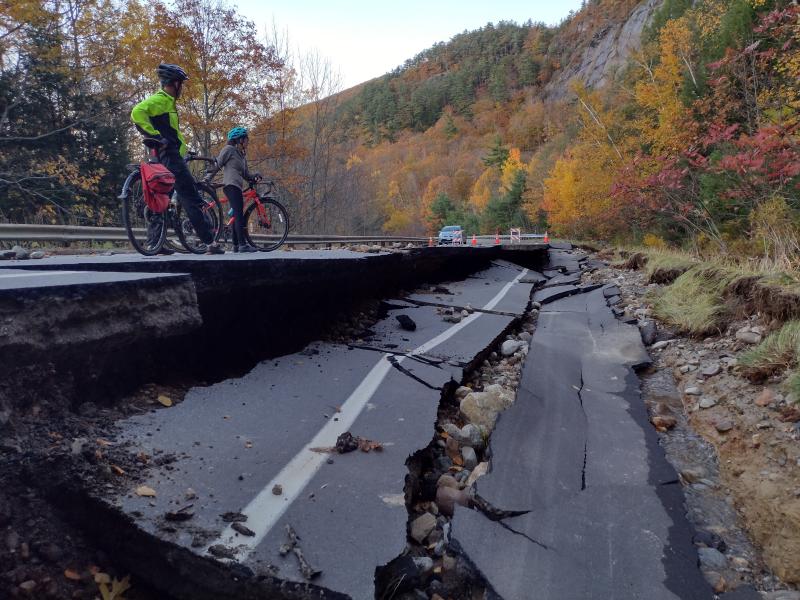Rockland, St. George, Rockport, Islesboro each receive $50,000 grants through Maine’s Community Resilience Partnership
 Turnpike Drive in Camden, Oct. 31, 2021, following a heavy rain storm. Route 52 was closed for six days while repairs were made to the state-owned road that is heavily used by commuters traveling to and from Lincolnville and other towns. Turnpike Drive, between Beveridge Farm and Maiden Cliff parking lot, washed out and closed in the early morning hours of Oct. 31, 2021, following a tremendous rain and wind storm that dumped more than 5.5 inches of rain in the course of several hours in the immediate Midcoast, causing much damage in the local region. (Photo courtesy Brian Robinson)
Turnpike Drive in Camden, Oct. 31, 2021, following a heavy rain storm. Route 52 was closed for six days while repairs were made to the state-owned road that is heavily used by commuters traveling to and from Lincolnville and other towns. Turnpike Drive, between Beveridge Farm and Maiden Cliff parking lot, washed out and closed in the early morning hours of Oct. 31, 2021, following a tremendous rain and wind storm that dumped more than 5.5 inches of rain in the course of several hours in the immediate Midcoast, causing much damage in the local region. (Photo courtesy Brian Robinson)
 Turnpike Drive in Camden, Oct. 31, 2021, following a heavy rain storm. Route 52 was closed for six days while repairs were made to the state-owned road that is heavily used by commuters traveling to and from Lincolnville and other towns. Turnpike Drive, between Beveridge Farm and Maiden Cliff parking lot, washed out and closed in the early morning hours of Oct. 31, 2021, following a tremendous rain and wind storm that dumped more than 5.5 inches of rain in the course of several hours in the immediate Midcoast, causing much damage in the local region. (Photo courtesy Brian Robinson)
Turnpike Drive in Camden, Oct. 31, 2021, following a heavy rain storm. Route 52 was closed for six days while repairs were made to the state-owned road that is heavily used by commuters traveling to and from Lincolnville and other towns. Turnpike Drive, between Beveridge Farm and Maiden Cliff parking lot, washed out and closed in the early morning hours of Oct. 31, 2021, following a tremendous rain and wind storm that dumped more than 5.5 inches of rain in the course of several hours in the immediate Midcoast, causing much damage in the local region. (Photo courtesy Brian Robinson)
Five Midcoast municipalities are among multiple statewide recipients of Community Action Grants through Maine’s Community Resiliency Partnership.
The total $2.9 million in grant distributions announced Dec. 1 derives from the state’s General Fund and is to support 91 Maine cities, towns and tribal governments.
The Partnership was initiated under the State’s climate action plan, Maine Won’t Wait, announced by the Maine Climate Council December 1, 2020. The Council, an assembly of scientists, citizens, industry leaders, and bipartisan local and state officials, was created by the Governor in 2019 and charged with developing a plan for Maine to reduce greenhouse gas emissions, increase resilience to effects of climate change, and achieve carbon neutrality by 2045, according to the Governor’s Office of Policy Innovation and the Future.
The goal of this funding round is to support communities to plan for climate change, reduce carbon emissions, transition to clean energy, and increase their resilience to the effects of climate change, according to the Governor’s Office.
Camden: $2,000, “EV Purchase for Code Enforcement Officers/Plumbing Inspector”, purchase EV for code enforcement officers; install level 2 charger at public safety building for municipal fleet use; EV and Efficiency Maine education materials;
Islesboro: $50,000, to be used for “The Narrows and Beyond: Resilience Planner Pilot,” hire part time project facilitator; RFP for engineering firm; assess adaptation options for the Narrows using new STS SLR projections; community engagement; adopt a strategy; funding opportunity research;
Rockland: $50,000, “Climate-Ready Landside Infrastructure for Rockland Downtown Waterfront,” redesign (survey and geotechnical) and preliminary engineering for landside waterfront infrastructure;
Rockport: $50,000, “Rockport Climate Vulnerability, GHG Emissions Assessment and Outreach Plan Development: Equitable and Bold Climate Strategies for Rockport’s Future,” municipal and community GHG inventory; social, infrastructure, and ecosystem vulnerability assessments; outreach plan.
St. George: $49,600, “Visualizing Solutions: Assessing Vulnerable Infrastructure & Sites, Exploring Options and Engaging the Community Through 3-D Imaging”, data acquisition; data processing and 3D modeling and visualization; mitigation analysis and design charettes; community engagement;
Since the program was first announced by Governor Mills last December, some 127 cities, towns and Tribal governments in Maine have chosen to participate in the Partnership either as individual entities or in regional coalitions. Grantees during this round include:
- Fort Kent, to support climate preparation through culvert and storm drain mapping and inventory, and modeling projections for precipitation and flooding;
- Chebeague Island, to conduct a climate vulnerability assessment, greenhouse gas emissions inventory, and groundwater sustainability study and monitoring;
- Aroostook Band of Micmacs, to expand solar power to a tribe-owned fish hatchery, which distributes fish to tribal members and community food pantries.
The full list of grant recipients and participating communities is available here.
The Governor also announced Dec. 1 she is awarding $2.5 million in workforce grants, funded by her Maine Jobs & Recovery Plan, to nine organizations through her Clean Energy Partnership, which supports the development of good-paying clean energy and energy efficiency jobs.
Other grantees during this round include:
- Kennebec Valley Community College, to expand training programs for electric vehicle repair and solar installation careers;
- Associated General Contractors of Maine, to expand construction pre-apprenticeship programs in Maine high schools;
- Northeast Energy Efficiency Partnerships, to develop a clean energy internship program for Maine-based college students and residents with Maine-based clean energy companies.
The full list of grant recipients and participating communities is available here.
Supported by several incentive programs created by the Mills Administration and aligned with Maine Won’t Wait, Maine people have installed more than 82,000 high-efficiency heat pumps, registered more than 8,500 electric vehicles, and weatherized more than 9,100 homes. For more information about Maine’s climate actions, please visit the State’s new dashboard at maine.gov/climateplan/dashboard.
Since taking office in 2019, Governor Mills has taken significant action against climate change in Maine including investing:
- $50 million in energy efficiency programs, such as weatherization and efficiency upgrades for households, schools, towns, non-profits, and hospitality businesses.
- $50 million for affordable housing, which includes assistance for communities, developers, and builders to encourage construction of affordable, energy efficient housing.
- $20 million for municipal grants to protect vital infrastructure from effects of climate change as flooding, rising sea levels, and extreme storms.
- $40 million for land conservation, which contributes to the fight against climate change by maximizing carbon storage, supporting working waterfronts, farms, and forests, and ensuring valuable ecosystems remain in place for future generations.
The federal Bipartisan Infrastructure Law (BIL) is also committing $2.4 billion to Maine, including significant funds to modernize the electrical grid, expand electric vehicle charging, make infrastructure more resilient, accelerate home weatherization, expand public transportation options, and support the transition to clean energy.
For more information on BIL in Maine, visit maine.gov/bil.























